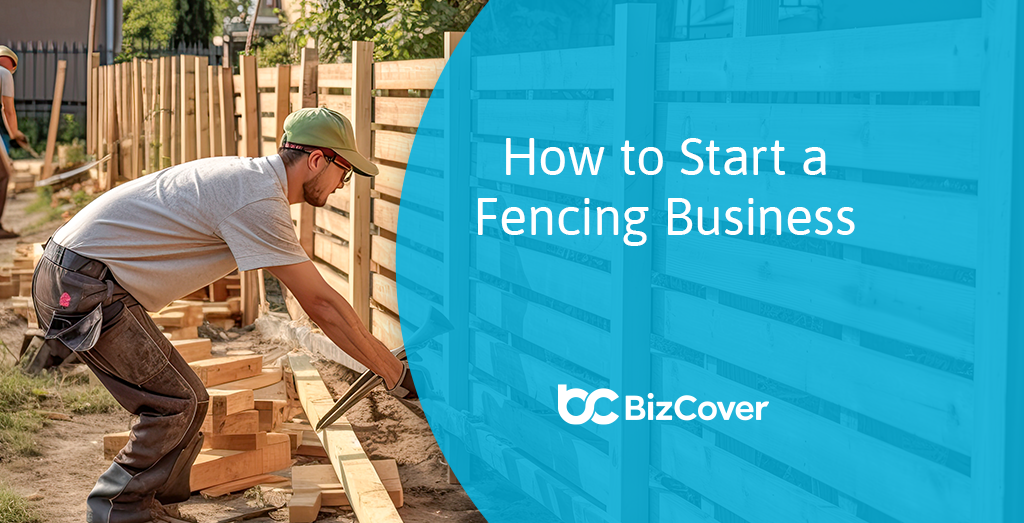How to start a fencing business in Australia
Starting a fence business can be a great way for you to monetise your building and construction skills. However, you will need a plan. This guide will help you learn the steps to starting your own fence business, while also touching on strategies for reducing your exposure to fencing business risks, including fencing insurance*.
Defining a fencing business
Fences are often installed in homes and business premises to improve privacy and safety, as well as to mark boundaries. Fencing businesses install permanent and temporary fences, and gates.
Chain wire, glass, and PVC fences are popular fence styles throughout Australia. Fence repair and fence removal are some of the additional services that some of services that many fencing companies provide.
How to grow a fencing business
1. Do market research to define your target audience
Research the market to learn about the most popular fencing types in your area, and what types of work is best for you.
If you live in a region where there are many backyard pools in homes, you might want to specialise in pool fencing. If you live in rural or regional areas, you may want to specialise in fencing for farms.
2. Create your fencing business strategy
Next you will create your fencing business plan. This should include the upfront costs of purchasing equipment and supplies for fencing installation. It should also include a list of prices and estimates of your income and expenses. You can meet the upfront costs by applying for a small business loan from your bank.
3. Create your fencing brand and register your business
Select a name for your fencing business and create an engaging company logo. Make it memorable and ensure that it reflects the niche you are in. It’s mandatory to register your company name with ASIC unless you are using your own name.
4. Invest in quality fencing tools and equipment
You will need to use a van or truck for transporting materials and tools as you will be working at the customers’ premises. You’ll also need the right tools and materials, depending on what type of fencing you choose to specialise in.
5. Choose the right structure for your business
As a fencing contractor it is important to choose a business structure for your business that will help you achieve your business goals. Due to the low cost and ease of administration, many trade business owners choose the Sole Trader business structure.
If you wish to protect your assets and share profits with others, or want additional protection, then a company business structure may be the right fit for you.
6. Consider your legal requirements
You will have to deal with both customers and suppliers as a fence business owner. You should have all the necessary documents on hand, such as your Service Level Agreement (SLA) or Wholesale Agreement.
7. Promote your fencing business
Since most people do not need fencing services on a daily basis, it is important to reach out to as many clients as possible to improve your strike rate and grow your business. You can start by actively searching for jobs on online job marketplaces such as Airtasker or Hipages.
You can also offer free no obligation quotes to potential customers. This gives you a valid reason to speak directly with customers about their fencing needs. All of these options can help you to grow a fencing business.
8. Skills needed to start a fencing business
You can get your shiny new fencing business started on the right foot by focusing on developing the following critical fencing skills:
- Building and construction skills: Since you will be installing fences and repairing them, you should have some hands-on experience installing fences of various types.
- You should be familiar with state and local building codes: Be sure that you clearly know the requirements for fencing in your area so that you can meet your client’s expectations while adhering to the area’s specific fencing requirements, which can vary for each local government area.
- Negotiation skills: Being skilled when it comes negotiating pricing and the terms with your fencing clients is important for fencing business owners because it will enables you to maintain your preferred profit margins.
- Customer service skills: Since you will regularly meet with customers to discuss their fencing needs, it is important that you know what key questions to ask them so you can clearly understand the scope of the job and provide work that meets their expectations.
9. Fencing licences, qualifications, and courses
In Australia, the building and construction industries are heavily regulated. Before you can start residential construction work, you will need to complete a fencing course and obtain your fencing licence. The licensing requirements in each Australian state and territory vary, so carefully check with the appropriate governing body before committing to anything with a client.
In New South Wales for example, you will need a fencing licence to perform any residential construction work, including fencing, that costs more than $5,000. This includes both labour and materials.
For a contractor’s licence, you will need to have completed a fencing course such as a Certificate I in Construction, as well as additional units as may be required in your home state. You will also need to provide information about your past employment, experience, and any compliance issues.
10. Create your fencing business plan
Write a business plan for your fencing company. You can use this to identify your target customers, determine how you will stand out among your competitors and use it to drive your fencing business strategy.
A fencing business plan may also be required if you are seeking start-up capital for your business. Investors will want to ensure that their investment in your business is spent wisely.
Your fencing business plan can include the following:
- Table of contents and cover page describing the document and its contents.
- Executive summary, which covers the main points of your business plan on one page.
- An overview of your business that introduces it and describes it.
- A list of fencing services you intend to offer your customers.
- Your pricing strategy for fence installation services.
- Target market analysis to help identify and evaluate the market, opportunities, challenges, and your ideal customers (such as their age, income, and family status).
- Competitive analysis of other local fencing companies, and the strategies that you will use to stand out from the fencing competition in your area. For example, this may include filling a niche, such as wrought iron fencing.
- Your marketing plan to advertise your fencing business and win new customers.
- Employee planning, including which roles you plan on hiring and when.
- Financial projections and cash flow strategy for your first full year as a fencing business owner, taking into account all of your expected business expenses.
11. Fencing equipment and tools for a fencing business
You will very likely require the following to run your fencing business efficiently:
- a truck or van for your fencing materials;
- a concrete mixer;
- fencing tools for hard to get to areas, such as hammers, shovels, and rakes;
- a sturdy wheelbarrow;
- wire spinner;
- post driver;
- post lifter;
- chain strainer;
- hog ring plier; and
- fencing staples.
12. Create your fencing business website
You have your fencing equipment and you have completed your fencing course; now you can promote your fencing business. A carefully planned and strategically developed fencing business website is your online calling card for new fencing business enquiries.
Use your fencing company website to showcase your work and describe what you do and how you do it. Include your fencing qualifications and experience, along with your contact details.
13. Structuring your fencing business
After you’ve obtained your fencing licence and are equipped with the necessary fencing tools and equipment, it’s time to choose your business structure.
The following are common business structures in Australia:
- Sole Trader: In Australia, many trades are run by a sole trader. If you are the sole owner of the business and want to minimise costs and paperwork, this is the easiest option.
- Partnership: You can start a fencing business with your partner and set it up as a partnership, which means that you are both jointly responsible for running the business.
- Company: Although a company has higher set-up and administrative costs, it enables you to be more flexible if your goal is to share the company’s profit or to bring in external investors as shareholders. The company structure also protects your assets in the event that the business is unable to pay its debts.
14. Do I require legal documents and advice?
You will be dealing with clients and suppliers on a regular basis, so it is important to be prepared to protect your fencing business. Documents that can prove handy here include:
- Service level agreements with customers that define the scope of work, payment terms, and the liability of each party.
- A policy on cancellations for handling last-minute cancellations or no-shows.
- If you need extra help from an offsider to install fences, then an independent fencing contractor agreement or employment contract is required.
- If you are ordering or buying materials in bulk from suppliers, consider using a wholesale contract.
15. Market your fencing business
When starting your fencing business, marketing is a fantastic way to engage customers, get your name out there, and create lead generation. For example, if you specialise in pool gates and fencing, then reach out to pool builders about subcontracting.
You can also respond to job requests posted on online marketplaces such as Airtasker or hipages. Advertise your fencing services on social media and invest in physical marketing tools as well, such as brochures, business cards, and signage to grow your customer base.
16. Fencing pricing guide
Pricing your fencing services can be tricky. You need to earn a living, but you also need to set your prices to attract paying customers. To a large degree your fencing prices will be influenced by how you position your fencing business.
Is your fencing business positioned as a premium or luxury brand? Or are trying to be the most cost-effective fencing business in your local area? There are benefits to both, but your fencing business will be better off if you make a clear decision on your fencing pricing.
As noted by industry sources, fencing cost can range depending on the materials you choose. You can expect to pay $75 – $120 per metre for a treated pine paling fence, $80 – $125 per metre for a hardwood paling fence, $450 – $600 per metre for a wrought iron fence or $800 – $1,200 per metre for a sandstone and timber fence.
Fencing FAQs
What should I charge for my fencing services?
When it comes to the critical question of how to price your fencing services, the cost of fencing materials, project size, and soil type will all affect the price you will charge your clients. Decide whether you will pitch your fencing business as cost-effective or charge a premium price and position your business as a high-end fencing company.
Can a fence business be profitable?
While profits can vary depending on the price of fencing materials, how long a fencer takes to finish a job, and what they charge their customers, fencing businesses business can certainly be profitable. With widespread public and private investment in infrastructure and new developments, opportunities for competent fencers will only grow.
Is construction experience required to start a fence business?
Yes. To get a contractor licence, most Australia states and territories require that fencers show proof of previous construction experience or industry training. Find out what qualifications are required by the regulator in your home state for obtaining a contractor licence.
Reduce your exposure to fencing risk with BizCover
BizCover is here to help you get your new fencing business off on the right foot by making purchasing your fencing insurance drama free.
At BizCover we have made purchasing small business insurance quick and easy for over 250,000 Australian small business owners. And you can join them by jumping over to our fencing insurance page to compare competitive quotes from Australia’s leading insurers.
Give BizCover a bell on 1300 920 868 to get your fencing insurance in just 10 minutes and get back to doing what you do best.
This information is general only and does not take into account your objectives, financial situation or needs. It should not be relied upon as advice. As with any insurance, cover will be subject to the terms, conditions and exclusions contained in the policy wording. © 2025 BizCover Limited.





